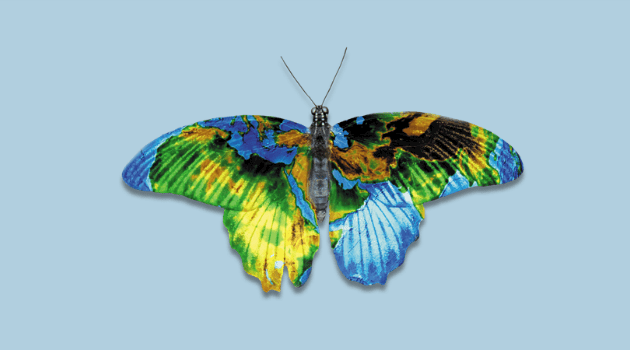This year is the hottest on record. We have seen alarming temperatures in September and October, debilitating heatwaves, intense rain, flooding, wildfires, droughts and destroyed crops. The impacts of climate change are very real and are happening faster than anyone expected, and yet we released more carbon dioxide this year than we ever have before.
Many in the science community believe that keeping global warming below 1.5C is now a pipe dream. We are on track to meet just 12% of the UN Sustainable Development Goals (SDGs) despite being halfway to the target date. Almost a third (30%) have stalled or made negative progress. The UK, which was leading the way in the transition to net zero emissions, is now backpedalling on commitments. The Office for Budget Responsibility (OBR) ranks the risks of a late transition in the UK as “high”.
Business takes point
We are at a point where business is the voice of progress when it comes to meeting climate goals. Business leaders have been criticising governments for pulling focus from net zero, calling for consistent targets. The World Economic Forum (WEF) has ranked climate change inaction and ecosystem collapse as among the biggest risks for global economies. When the UN revealed how little progress had been made on meeting the SDGs, a coalition of professional organisations – including ICAEW – were among the voices calling for faster, more immediate action.
Businesses and finance institutions are leading the way because this is a business and financial issue. A global coalition of central banks have acknowledged that nature-related risks could have significant macroeconomic and financial implications. Worsening climate change, nature loss and inequality is not just a human tragedy, it’s a risk to global financial stability.
The World Bank estimates that climate change will push 130 million people into poverty within a decade, causing more than 200 million people to migrate within their own countries by 2050. The collapse of select ecosystem services provided by nature, such as wild pollination, provision of food from marine fisheries and timber from native forests, could result in a decline in global GDP of $2.7trn annually by 2030.
Ecosystem collapse would also lead to many countries facing sovereign credit downgrades, increasing annual interest payments and leaving them at significant risk of sovereign debt default.
The science shows that we need to halve carbon emissions and reverse global nature loss by 2030. To achieve this, we need to urgently transition to a net zero, nature positive, socially just economy and finance system.
Hold governments to account
It is imperative that organisations continue to hold governments to account on their existing commitments while also calling for more ambitious action on net zero, nature and social equality. We’re at a point where we can no longer delay action.
The COP summits are at the heart of global negotiations around combatting climate change. Nations make more commitments as a result, but it’s not often about the practical steps to get things done. ICAEW is attending COP28 to build on connections that will last long after the summit is over. It is before and after COP that the real work happens, and our aim is to collaborate with organisations, politicians and businesses to accelerate progress.
Our focus is on making sure that we make this transition quickly, but in the right way. Climate, nature and society are intrinsically linked. We must consider all three equally in our transition planning to create a truly sustainable future for business, humanity and for life on Earth in general. We cannot solve the climate crisis without reversing nature loss. We cannot make the world a more equal place without addressing the environmental crisis. And we cannot reach net zero without bringing all of society with us.
Risk vs opportunity
It’s also worth noting that where there is risk there is opportunity. Turbo-charging innovation and investment in net zero and nature-positive activities is a significant opportunity to drive sustainable economic growth and build the resilient businesses of the future.
As the government’s own advisers acknowledge, realising this vision for the future requires deep, transformative, cross-economy action, alongside global coordination, ambition and political will on a scale never previously achieved by humanity.
ICAEW’s ultimate objective with this series is to boost member engagement and understanding on how critical these issues are. This isn’t just an issue for governments to deal with; the business community has massive influence. They need to be part of the conversation.
We desperately need global leadership, cooperation and bold and robust policy to help put the economy on a long-term path to prosperity and give business the certainty it needs. If we don’t, our future prosperity – and our very existence – are at risk.
More news on sustainability reporting
More on ESG assurance
Visit our ESG assurance hub, where we walk you through everything you need to know about ESG assurance.




